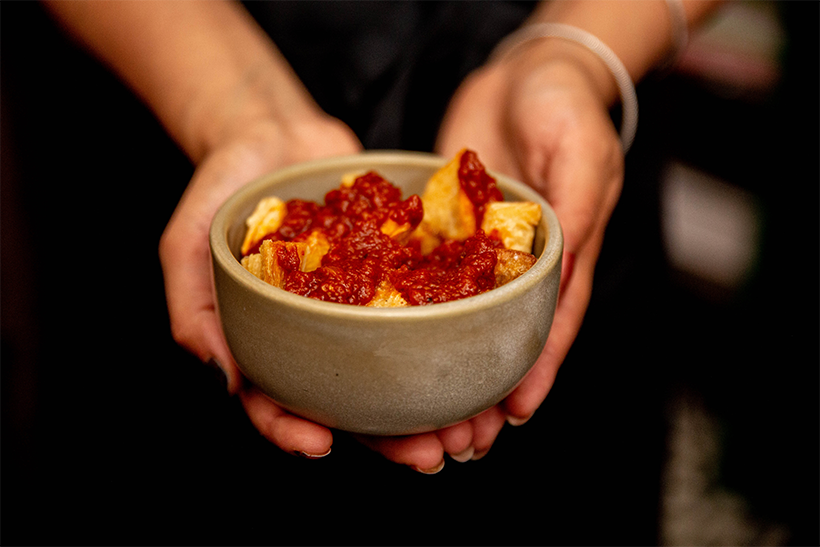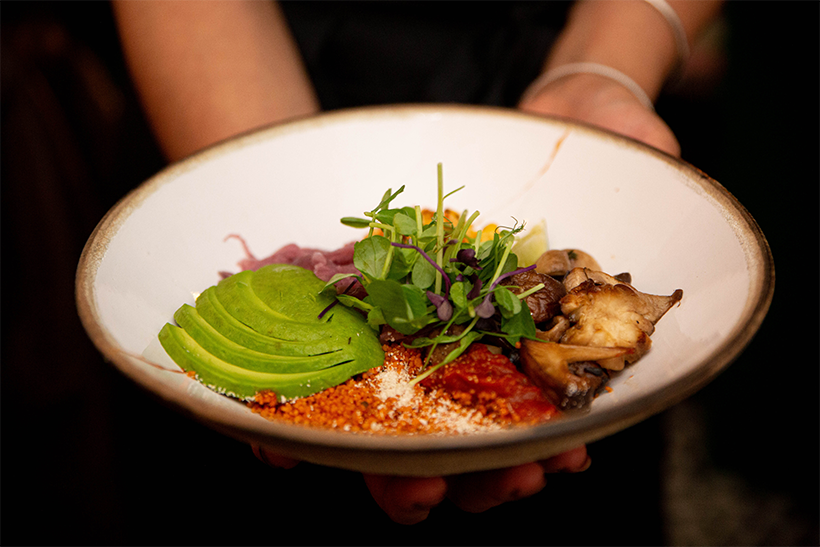Tatale serves up West African food in London
With new restaurant Tatale in London, Akwasi Brenya-Mensa wants to provide a gateway to pan-African cuisine. Here's how a trip to Ghana inspired him to get back to his roots and serve up a feast
Akwasi Brenya-Mensa is a man of many talents, and at pan-African eatery Tatale, he plans to showcase not only his own skills at the stove, but also to provide a floor for up-and-coming African chefs and hospitality professionals to step into the spotlight.
He describes himself as a broadcaster and curator. He's worked in events management, studied criminology and social policy and film at university, and travelled the world as a musician and tour manager. Not one to sit still or stay in a single lane, Brenya-Mensa also ran his own pop-up kitchen in Sheffield, his university town, and eventually opening his own city centre restaurant, which was crowned number one on Trip- advisor in 2017. He's toured the world with his supper club, cooking in destinations like Lisbon, Berlin and Puerto Rico, and now he's got his sights set on the London food scene with a pan-African eatery that "tells stories through food, art and culture".
Tatale, which opened in Southwark's Africa Centre on 14 July, brings together African ingredients in a series of hybrid dishes, from Ghanaian favourites to Caribbean and Brazilian flavours. It's named after a kind of Ghanaian pancake made from plantain, an ingredient which he says is "at the heart of the Black experience".
Akwasi Brenya-Mensa's family inspiration
A career in cooking might not seem like the obvious choice for a criminology and film graduate who has worked in music for much of his career, but food has always been a big part of his life, he says: "I started in the kitchen with my mum. I was the eldest child, so I was her helper. I always enjoyed being in the kitchen with her, and then when I was older my parents often worked in the evenings or had second jobs, so I then became responsible for my brothers and it just developed from there."
From watching her preparing live crabs to using her trusty asanka bowl – a West African grinding pot – he has fond, vivid memories of his mother's kitchen. But he didn't need such tools or ingredients for his initial food start-up, as his first foray into cooking professionally came through a love of something very American: burgers.
"I've had a love for burgers since I was little because when my dad made breakfast, he would often opt for simple things, so we'd sometimes eat burgers for breakfast. Then, when the gourmet burger wave hit London, I found that really exciting."
Brenya-Mensa started making his own iterations of gourmet burgers with homemade sauces and patties, and then he cooked for friends and family at barbecues and parties. "One thing led to another" and he ended up getting a slot at a local street market in Sheffield. He later ran the kitchen at Fear x Loathing with an extensive burger menu, winning the top slot for restaurants in Sheffield on Tripadvisor in 2017.
Quite incredibly, Brenya-Mensa achieved all of this without any formal training, and it was only in 2020 that he received mentorship from James Cochran at his London restaurant, 12:51. After a fortnight's stint in the kitchens there, Cochran was impressed and kept Brenya-Mensa on after the lockdown during the start of the pandemic.
Tatale supper clubs to London restaurant
While it sounds like Brenya-Mensa had a string of great successes, he's the first to criticise his own work. He says he's always been entrepreneurial and followed his passions to create projects and businesses – sometimes by accident – but he hasn't always got it right.
"My first supper club was a car crash," he says. "There were some factors out of my control, like staff not turning up, but other things were my fault – I definitely had not prepared enough and I oversold the tickets. But you make the mistakes and then next time you do it better. People gave me a second chance and came to other supper clubs I did and I've been very grateful for that."
It's these supper clubs, which featured dishes he'd tried while travelling the world, that have influenced the creation of Tatale. "I was travelling, immersing myself in other cultures and cuisines and then creating versions of what I'd tried in other places. So when I went to Ghana in 2019 [on a government-funded trip for the national diaspora], I realised this process – immersion, recreation and experimentation, then creation at the end of it – could be applied to my own heritage."
Much like his trip to Ghana was a gateway to exploring and understanding more about West Africa, he says Tatale will be a gateway for people to explore African food, ingredients and flavours. The ultimate aim, he says is to make it accessible and empower people to feel confident when ordering African dishes in other restaurants.
"London needs this restaurant," says Brenya-Mensa, "because we've seen an increasing number of African restaurants popping up over the past three to five years, as well as increasing interest in those restaurants, their stories and the people behind them, and while that's fantastic, I think we've seen probably more activity at the fine dining end of the spectrum but not as much in the casual space or at an accessible price point. I think being able to provide a pan-African food offering at an affordable rate is really exciting."
African cuisines in London
But it's not just about financial accessibility, says Brenya-Mensa. He doesn't want his food to be intimidating to those unfamiliar with African cuisines. "My approach is to have a combination of familiarity and discovery. One of our most popular dishes is a black-eyed bean hummus. I developed that dish when I went to Tel Aviv in 2018, when I was touring with the music industry. Hummus is a dish that lots of people know, but black-eyed beans are indigenous to West Africa and we use a lot in our cooking, so for me this is a gateway dish.
"I'm trying to connect the dots and provide more well-known ways of using these ingredients, while mixing it up with things people are completely unfamiliar with to maintain the tradition and authenticity. Having accessibility in the mix is a difficult line to tread, but hopefully one we'll tread well because that's how we've been successful."
Authenticity and accessibility don't always go together, and when asked whether he thinks people will criticise him for diluting or bastardising the African dishes he chooses, he's steadfast in his opinion: "they're wrong".
"I'm simply creating dishes from my lived experience. I don't think anybody, even people from within the cultural heritage, can have anything to say about someone's creativity or someone's output or someone's approach. It's my creativity. It's my heart. And I will do it however I want to, and if you don't like it, you do not have to come."
Of course, he hopes you will come. If not for the food, then to support the initiatives that will surround the kitchen at Tatale. With just 33 seats for dining but enough room for 100 standing, the restaurant will be reminiscent of the traditional West African chop bars that are ubiquitous across Ghana and its neighbouring nations, and it will aim to support Black artists from all industries. He'll curate playlists focused around Black musicians – many of which you can already hear on his NTS radio show Black to the Future – and works by African artists will adorn the walls. Expect talks, regular events and collaborations with other African food creatives.
Black talent in hospitality
Giving back is something that's always been important to Brenya-Mensa. As part of the entry fee for his supper clubs, all diners were required to bring along dried or canned food, which would later be donated to a local food bank. "I wanted to use my supper clubs to do good with a charitable aspect," he says.
Tatale will go one step further, with a mentorship scheme for aspiring Black hospitality professionals and the creation of the Pan-African Social Club Incubator in collaboration with the London Mayor's office. "It will see that Black food talent is represented at major festivals and events in London and further afield," he writes on his Kickstarter campaign page. "Only when Black people are fairly represented and fairly compensated for their work and their culture, will things start to change."
To really be pan-African, though, Brenya-Mensa will no doubt need to rely on other Black chefs. "I know about Ghanaian cuisine and West African cuisine. I have travelled to other places, but it's a big continent of over50 countries. There's no way I could profess to be representative of all of that. So I think inviting other chefs to our kitchen, whether they're guesting on nights we're operational or hosting chefs to do events or supper clubs, or providing the space for events for people in the community to hold culinary events, that's how we'll achieve our goal of being pan-African.
"It's important that, as someone who's come through the supper club route, I do what I can to support others because I know how difficult it is. My goal, my hope, is to make it easier for up-and-coming African chefs or chefs of Black origin."
From the Tatale menu
Tatale's menu is set to evolve as the restaurant settles into its new home in the African Centre, but these are some of the highlights hitting tables during opening week.
Omo tuo A Ghanaian rice dish often served with soup and chicken. Brenya-Mensa's version will be vegan, but still packed with classic Ghanaian flavours.
Black-eyed bean hummus Inspired by his travels through Israel during his music career, this traditional Israeli dish is given an African twist, replacing the chickpeas with black-eyed beans.
Geelrys A favourite South African side dish of yellow rice, which Brenya-Mensa serves with fried shallots and sultanas.
Ackee croquettes Bringing in some Caribbean influence, these croquettes made from ackee fruit come with a curry emulsion for a pop of extra flavour.
Chichinga buttermilk fried chicken wings Inspired by Ghana's popular street food kebabs but made with buttermilk.
Oyster mushrooms with jollof couscous Taking inspiration from Ethiopian cuisine and the rice dishes of West Africa, this mushroom dish also features plantain.
Continue reading
You need to be a premium member to view this. Subscribe from just 99p per week.
Already subscribed? Log In









